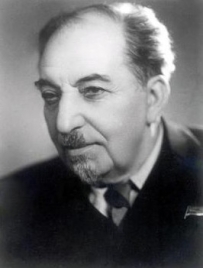Avetik Isahakyan
Wednesday, April 9, 2025
Isahakyan was born in Alexandropol (present-day Gyumri, Armenia) in 1875. He was educated at the Gevorgian Seminary in Etchmiadzin, and later at the University of Leipzig, where he studied philosophy and anthropology. He started his literary as well as political careers in his early youth. Upon his return from Leipzig in 1895 he entered the ranks of the newly established Alexandropol committee of the Armenian Revolutionary Federation. Through his activities he supported armed groups and financial aid sent to Ottoman Armenia from Alexandropol. He was arrested in 1896 and spent a year in Yerevan’s prison.
Later Isahakyan went abroad, attending literature and history of philosophy classes at the University of Zurich. He returned to his homeland in 1902, and then moved to Tiflis (modern-day Tbilisi).
Together with 158 other Armenian intellectuals, he was arrested in 1908 and after spending half a year in Tiflis's Metekha prison (just like Hovhannes Tumanyan), he was freed on bail. Staying in the Caucasus was no longer possible, and by 1911 Isahakyan had emigrated.
Isahakyan did not believe the promises made by the government of the Young Turks regarding self-government and autonomy of Ottoman Armenia. Assured that the danger of Pan-Turkism (which he believed was aimed at the total extinction of Armenians) could be prevented by Turkey’s supporter, Germany, Isahakyan went to Berlin. There, together with a number of German intellectuals, he participated in the German-Armenian movement, and edited the group’s journal Mesrob and co-founded German–Armenian Society. The start of World War I and the horrifying massacres confirmed his gruesome predictions about the annihilating nature of the Young Turks government's policies. After the war and the Armenian genocide, Isahakyan described through his compositions the Armenians' sorrowful destiny and their heroic struggle for freedom. The poet put forward the genocide accusations, the worst part of which had taken place between 1915 and 1922, in "The White Book". During that period, Isahakyan expressed his ideas mainly through his social and political articles, in which he discussed the topics of the Armenian cause, reunification of Armenia and the restoration of the Armenian government. The images of the massacres are persistent in his poems, such as "Snow has Covered Everything...", "To Armenia...", and "Here Comes Spring Again".
Korney Chukovsky met him in Kislovodsk in 1926 and wrote in his diary:
I've just had a visit from four Armenians, one of whom, Avetik Isaakyan, is a well-known poet. I can't tell you what a nice man he is: modest, quiet, completely unaffected. He spent a fortnight here without anyone's knowing who he was. Yet his fame is such that when I mentioned him to our Armenian barber, he immediately beamed and started reciting his poetry in Armenian. The shoeshine man had the same reaction: "Avetik! Avetik!" He has a sad, absent look about him. They say the regime (which pays him a small pension) won't let him visit his family abroad. I was surprised to find that he was unable to recite even four lines of his verse in Armenian when I asked him to: he's forgotten everything. And when we had an Armenian evening and his poems were read from the podium he just sat there in the audience, hunched forward, his hands over his face. He refused to go out on the podium or utter a single word.
Isahakyan again went abroad in 1930 and lived in Paris, but returned permanently to the Armenian SSR in 1936, where he was elected to the Academy of Sciences of the Armenian SSR in 1943 and president of the Writers Union of the Armenian SSR in 1944. He was awarded the Stalin State Prize in 1946, served as a member of the Soviet Committee for Protection of Peace, and was a deputy of the II-IV Supreme Soviets of the Armenian SSRarded the Order of Lenin twice and decorated with other medal.vetik Isahakyan's tomb at Yereva's Komitas Pantheon
Seeing that Gyumri's famous satirist Poloz Mukuch did not have a tombstone twenty years after his death, Isahakyan ordered one, with the side of the tombstone reading "To Poloz Mukuch (Mkrtich Ghazarosi Melkonyan); and the other side: "A memento from the poet Avetik Isahakyan."
Avetik Isahakyan died in Yerevan in 1957. He is buried at Komitas Pantheon, which is located in the city center of Yerevan.





